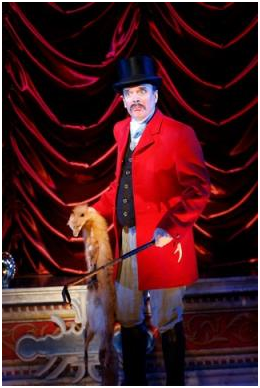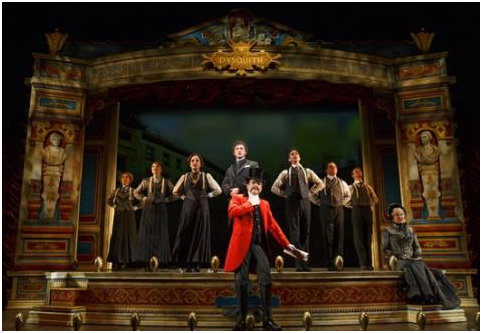A Gentleman’s Guide to Love & Murder
A charming evening which gives Jefferson Mays the role of a lifetime. Closest to Rupert Holmes' stage version of "The Mystery of Edwin Drood," another music hall-style evening, this is a delightful show that toys with some serious themes like the seven deadly sins in the lightest and most entertaining way.

Jefferson Mays in a scene from “A Gentleman’s Guide to Love & Murder” (Photo credit: Joan Marcus)
[avatar user=”Victor Gluck” size=”96″ align=”left” ] Victor Gluck, Editor-in-Chief[/avatar] If the plot of this new Broadway musical sounds familiar, it is simply that it is based on the same novel that inspired the British film, Kind Hearts and Coronets. A Gentleman’s Guide to Love & Murder is a delightful entertainment in the style of the British music hall that introduces a new writing team to Broadway: Robert L. Freedman (book and lyrics) and Steven Lutvak (music and lyrics). The most memorable part of the show is Tony Award winner Jefferson Mays who plays all eight of the D’Ysquiths, the upper class victims both male and female, just as Sir Alec Guiness did in Coronets. While Mays has already played 35 characters in the same evening in the Pulitzer Prize winning I Am My Own Wife by changing his voice and his demeanor, here he actually has to change into elaborate Edwardian costumes each time, quite a feat of legerdemain, as well as sing in character. He is also joined by the charming Bryce Pinkham as the black sheep protagonist who decides to get his revenge for being cut out of his inheritance. This confection has been brilliantly directed by Darko Tresnjak in a cartoon style much more suited to a Broadway musical that the drawing style of the famed British film.
Based on a 1907 novel by British author Roy Horniman, A Gentleman’s Guide begins with young Monty Navarro, now the ninth Earl of Highhurst (Pinkham), writing his memoirs in London’s Pentonville Prison while awaiting his trial for murder (ironically for the one murder in the tale he did not commit). He recalls how immediately after his mother’s funeral, he receives a visit in his shabby Clapham home from his mother’s old friend Miss Shingle, a woman of a certain age, who informs him that on his maternal side he is a D’Ysquith (pronounced Die – squith) as his mother Isabel D’Ysquith was disinherited when she married his Castilian father, and as such he is eighth in line to the title and estate of Highhurst Castle.
When his girlfriend, the beautiful and seductive Sibella Hallward (Lisa O’Hare), tells him that she will only marry for wealth and position, he decides to do something to secure both. After he is rejected for a job at the D’Ysquith Banking House, and the dotty and alcoholic Reverend Lord Ezekial D’Ysquith refuses to help him, he decides to go about getting his revenge in earnest. With the death of snobbish dandy Asquith D’Ysquith, Jr., his melancholy father Lord Asquith D’Ysquith, Sr., now without an heir offers Monty a job in the family firm. And Monty’s rise has begun, but so has his ambitions now that two of the eight heirs are out of the way, However, he then find that he is about to lose Sibella to a rich man of position. A series of unfortunate accidents to the D’Ysquith heirs make Monty’s ascension to the top of the family tree mighty quick indeed. When his cousin Henry (victim # 4) introduces him to his demure and lovely sister Phoebe (Lauren Worsham), Monty and Phoebe fall in love to the fury of his mistress Sibella, who is now married to the boring Lionel but continuing her relationship with Monty. Ultimately, Monty succeeds to the title only to have it almost plucked from his grasp. The surprise ending is different from the film but you will have to see both in order to find out the solution to that spoiler.

Cast with Bryce Pinkham as Monty Navarro (standing center), Jefferson Mays as Lord Adalbert D’Ysquith (in red coat) and Jane Carr as Miss Shingle (seated on right) (Photo credit: Joan Marcus)
The score by Freedman and Lutvak is a charming and melodic pastiche of Gilbert and Sullivan, music hall and operetta-inspired songs. The most cleverly staged are the ice skating number “Poison in My Pocket,” choreographed by Peggy Hickey, in which Monty follows D’Ysquith, Jr. and his girlfriend Miss Barley, a former chorus girl, onto the ice at a secluded resort, and “I’ve Decided to Marry You,” in which Monty is entertaining Sibella in the bedroom when Phoebe arrives at his drawing room to propose to him. Lord Adalbert’s witty, “I Don’t Understand the Poor” is a much in the style of G & S, while Phoebe and Monty’s duet, “Inside Out,” is a tribute to British music hall. A comic invention is contained in “Warning to Monty” and the later “Final Warning” in which the ancestral busts of Highhurst Castle come alive to give Monty some free advice. Ultimately, Sibella and Phoebe sing an impassioned duet, “That Horrible Woman,” in which each accuses the other of leading Monty astray.
Mays’ tour de force is so successful and convincing that it is difficult to believe that he is all eight of the D’Ysquiths. These vary from the pompous current eighth earl, Lord Adalbert, the doddering and inebriated Reverend Ezekial, the melancholy and serious Lord Asquith D’Ysquith, his insufferable snobbish dandy son, Asquith, Jr., eccentric beekeeper and country esquire Henry, misguided and buxom philanthropist Lady Hyacinth, muscle-bound eugenicist Major Lord Bartholomew, flamboyant melodramatic actress Lady Salome D’Ysquith Pumphrey, as well as one more for good measure. Mays proves himself to be as fine a comedian as the stars of the Silent Screen with suitably appropriate expressions for each of his characters. As his nemesis, Pinkham maintains his charm throughout and has the handsome looks and fine tenor to be the romantic leading man, though he is, in fact, playing a cold-blooded serial killer.
As the deceitful and delectable Sibella, O’Hare has all the necessary requirements to play this femme fatale including a perfect figure for the hour glass fashions of the period. Worsham is most beautiful in person and voice as the reserved and diffident Phoebe D’Ysquith, and puts her coloratura soprano to excellent use. Both Jane Carr as the possibly dotty Miss Shingle and Joanna Glushak as the acid-tongued Lady Eugenia, Countess D’Ysquith, are very amusing. Price Waldman has the solemn and unflappable Chief Inspector Pinckney down pat. The rest of the cast acquits themselves well in various other roles.
Alexander Dodge’s Edwardian sets which appear inside a reproduction of Pollock’s Toy Theater are always delightful. Linda Cho has created an enchanting collection of costumes from those for all of Mays’ transformations into the D’Ysquiths to the women’s lovely and seductive gowns. The amusing projection design is the work of Aaron Rhyne. Jonathan Tunick’s melodic orchestrations are always faithful to its Edwardian period and its music hall roots. Credit director Tresnjak, artistic director of Hartford Stage, now making his Broadway debut, with keeping this confection airborne throughout the evening, including when stretching credulity to the limit.
A Gentleman’s Guide to Love & Murder is a charming evening which gives Jefferson Mays the role of a lifetime. Closest to Rupert Holmes’ stage version of The Mystery of Edwin Drood, another music hall-style evening, this is a delightful show that toys with some serious themes like the seven deadly sins in the lightest and most entertaining way.
A Gentleman’s Guide to Love and Murder (closes on January 17, 2016)
Walter Kerr Theatre, 219 W. 48th Street, in Manhattan
For tickets, call 212- 239-6200 or visit http://www.agentlemansguidebroadway.com
Running time: two and a half hours including one intermission






Leave a comment